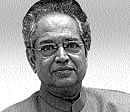'The judgment helps validation of homosexual identity'

Sequeira of Deccan Herald about the significance of the Delhi high court ruling on Section 377 of the CrPc.
How would you define homosexuality?
I think one basic distinction we need to make is between the same sex relationships and homosexuality. Same sex relationships can and do take place out of adolescent curiosity and in boarding schools, prisons or other places where partners of the opposite sex are not available. Homosexuality is an exclusive preference for a partner of the same sex. A self-definition as a homosexual is relatively new, first observed in the 19th century in the West. Same sex encounters and relationships have been observed and commented upon in most ancient societies, such as Greece and our own. My estimate is that if five to seven per cent of our population is homosexual, the percentage that has had same sex encounters will be well over 30 per cent.
Quite apart from decriminalising gay sex, how significant is the court ruling for the gay movement in India? Could it lead to a more assertive ‘coming out?’
The judgment is of enormous significance for those still struggling with their sexual identity, a vastly greater number than those who have accepted their homosexuality and constitute the gay movement. The phrase ‘coming out’ refers to the public
acknowledgment of one’s homosexuality, but there is an analogous internal ‘coming out,’ a sort of self-realisation that one is a homosexual.
My identity does not take place in a vacuum but needs my culture’s validation: not only my inner assertion, ‘I am this,’ but the culture’s ‘Yes, you are that.’ The court judgment makes it possible for our society to begin the process of validating homosexual identity, ie ‘You are a homosexual, not a criminal.’
Millions of men and women can now ask themselves ‘Who am I?’ rather than the much more painful ‘What is wrong with me?’ If this process lessens the emotional pain of millions which led to suicidal tendencies and substance abuse in hundreds of thousands, then it would have served its purpose. It is a signal to the homosexuals that they too can safely search for love and intimacy, a search that animates the rest of us.
How do you respond to the extreme view often put out that homosexuality is against the order of nature?
Sexuality, like everything else human, partakes not only of nature but also of culture. We do not eat, sleep, work or whatever else, naturally. Any one who fasts, because of his religious convictions or for other reasons, is going against the ‘order of nature.’ If by order of nature, it is meant that homosexuals do not procreate, then celibate Catholic priests and nuns, ascetic yogis and sadhvis, by refusing to procreate are also going against the order of nature and are equally culpable.
I read an essay of yours recently where you talk of India’s tradition of ‘benign neglect’ of alternate sexualities. Now that the issue is out in the open we can no longer be in denial about homosexuality in India...
In general, India has had a tradition of ‘benign neglect’ of alternate sexualities, a tradition that is very much a part of the Indian mind. The Indian tradition of indifference or deliberate ignorance, is also incompatible with the model of the Western gay movement which, like many Western imports finds many consumers in our major cities and which insists on the politics of a gay identity, of a proud or at least defiant assertion of homosexual identity that forces the rest of the society to confront the issue publicly. On the one hand, this assertion is valuable in repealing archaic laws. On the other, if it becomes too flamboyant, there is a danger, like the negative impact of the bra-burning activists on feminism in the West, of harming the gay cause.
Publicly there is a degree of discomfort too, with having to openly debate matters of a sexual nature...
One of the biggest benefits (of the court verdict) will be our society’s increased engagement with understanding the issue. We will employ more curiosity and reasoning rather than indulging in scare tactics or prejudice. We will look at homosexuality across cultures and in history to see how it was viewed at other times and other places and that the views of contemporary religious right — Christian, Muslim and Hindu — are only one way of looking at it. We will see that two of the most successful and creative civilisations of the past, ancient Greece and classical India, were much more tolerant but also that the tolerance was not unrestricted.
Here, I think the gay movement needs to be aware that tolerance is not approval. No major civilisation has approved of homosexuality, except ancient Greece. In ancient India, homosexual activity itself was ignored or stigmatised as inferior but never actively persecuted. In the dharmashastras, male homoerotic activity is punished, albeit mildly: a ritual bath or the payment of a small fine was often sufficient atonement. Moreover, the active partner in the sexual activity was not considered homosexual, only the passive one was stigmatised.
Deccan Herald is on WhatsApp Channels| Join now for Breaking News & Editor's Picks